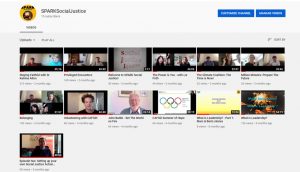 As reported earlier in the year the Justice and Peace Spark Social Justice Project quickly adapted to the lockdown restrictions. As schools were closed and everyone was encouraged to stay at home, the SPARK project went online. A series of recorded episodes were produced, with our young people taking the lead, interviewing a number of inspirational people, including our own J&P Chair John Battle. A new YouTube channel was launched and the videos went from strength to strength throughout the summer, attracting over 1000 views in total. The top video for views was the powerful conversation with Sr Katrina Alton ‘Staying Faithful’ in which she explains why she feels it is her faithful duty to take non-violent direct action. The project also gathered momentum on twitter, attracting up to 209 new followers.
As reported earlier in the year the Justice and Peace Spark Social Justice Project quickly adapted to the lockdown restrictions. As schools were closed and everyone was encouraged to stay at home, the SPARK project went online. A series of recorded episodes were produced, with our young people taking the lead, interviewing a number of inspirational people, including our own J&P Chair John Battle. A new YouTube channel was launched and the videos went from strength to strength throughout the summer, attracting over 1000 views in total. The top video for views was the powerful conversation with Sr Katrina Alton ‘Staying Faithful’ in which she explains why she feels it is her faithful duty to take non-violent direct action. The project also gathered momentum on twitter, attracting up to 209 new followers.

Although the schools and universities returned in September, it is impossible to visit and work with our young people in person. Following consultation with our partner education settings, an autumn programme of interactive, live online meetings with young people was launched. The weekly sessions involve young people and Lay Chaplains from three sixth forms; Notre Dame Sixth Form College, St John Fisher’s Harrogate and St Mary’s, Menston. So far, Marc Besford, President of Young Christian Workers, and Rosa Lewis from Caritas Westminster, have encouraged the young people to consider effective leadership; develop their own leadership skills; identify how they can use their own gifts and talents to help others and look at examples of how other young people have made a positive difference in their local communities. These meetings will continue up to Christmas and a number of different speakers have been invited to share their own experiences, with particular emphasis on how faith and community can bring about positive change. As part of the series, young people will also have the opportunity to express their thoughts and ideas about social justice issues creatively with visiting artists.
Under the guidance of their Lay Chaplain, students at Notre Dame have already set up a social action group and the young people who attend the weekly SPARK get-togethers feedback what they have learnt to their social action group in college. The hope is that other partner schools will follow a similar process with a view to creating self-sustaining Social Action Groups in each of the educational settings.
The Justice and Peace SPARK Project has already led to an exciting opportunity for one of the young interviewers, Tom Allan. Inspired by his excellent involvement in hosting the SPARK YouTube episodes, the Million Minutes charity are now developing a new podcast series with him as the main host. This is a great example of how the SPARK Social Justice project can have a long-term impact in a different way and inspire others too.
The success of SPARK in these challenging times is testament to the innovative, resourceful approach by project director, Aoibheann, whose response to the challenges of a global pandemic have resulted in our young people continuing to be inspired and given opportunities to influence and improve their own experience, communities and the future.
